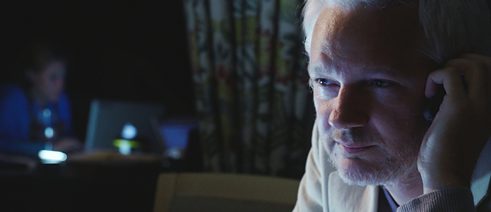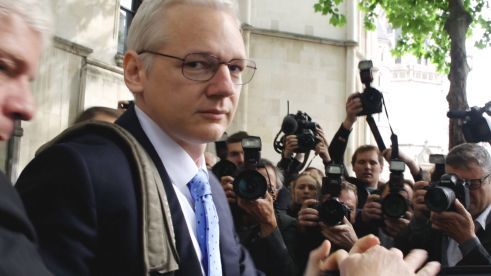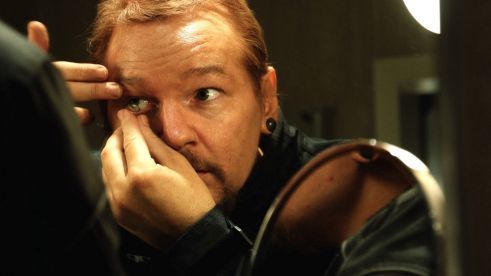Film Review
Pain and gain: Risk

Assange is a well-known name in much of the world for a plethora of reasons, and while Laura Poitras’ latest documentary isn’t the first attempt to delve into his exploits, it is the most personal.
“Sometimes the risk can be very high, but the opportunities can also be very high,” explains Julian Assange, chatting to the camera in Laura Poitras’ latest documentary. Its title springs from his words, but while the film chronicles the Australian WikiLeaks founder’s actions, it doesn’t merely chart the risks that have come to define his life. Beginning shooting in 2010, and covering a time period that spans until early 2017, Risk proves — among its obvious focus — a portrait of the struggle of recording reality. Assange adds to his risks as he purports to lay bare his thoughts and feelings; Poitras exposes her own as she follows a story that’s constantly shifting and evolving.
Indeed, when Poitras admits that “this is not the film I thought I was making” in one her vocalised production diaries, which serve as structural interludes between Risk’s sections, the documentary’s dual probe becomes apparent. The director of Oscar-winning fellow technology, surveillance, privacy and cyber-activism-focused effort Citizenfour mightn’t have intended for her current feature to interrogate her own methods, but, thanks to Assange, that becomes inevitable. When she raises her concerns with the audience — “I thought I could ignore the contradictions. I was wrong,” she offers — it’s impossible not to see Risk for what it is: a filmmaker coming to terms with a story and a subject that changed more rapidly than she could comfortably document. The fact that the film first premiered at the Cannes Film Festival in 2016, only to be re-edited afterwards prior to its ultimate cinema release, only solidifies that pervasive observation.
 The film 'Risk' chronicles the Australian WikiLeaks founder’s actions
| © Praxis Films 2016
The film 'Risk' chronicles the Australian WikiLeaks founder’s actions
| © Praxis Films 2016
A personal exploration
Weathering pain in search of investigative, informative, potentially enlightening gains, what loaded terrain the director and producer steps into. Assange is a well-known name in much of the world for a plethora of reasons, and while hers isn’t the first attempt to delve into his exploits, it is the most personal. Where Underground: The Julian Assange Story dramatised his youth, and The Fifth Estate his leap into the spotlight, Risk lets the man himself do much of the talking. And, while other factual analyses have graced screens — including Alex Gibney’s BAFTA-nominated We Steal Secrets: The Story of WikiLeaks — Risk is less concerned with his organisation, endeavouring instead to dive more intimately into what makes him tick. Endeavouring is the key word.Accordingly, cue two intertwined strands in a feature that, where Assange himself is concerned, already splinters off on a number of tangents. And, cue a fractured documentary clearly tussling with what it should be thanks to a subject who proves purposefully slippery — whether evading questioning with well-chosen words, or putting on a disguise to avoid being spotted by the media. Consequently, as it jumps back and forth through the timeline of Assange’s antics, Risk explores the man, his mission, the myth and his misdeeds, while also noting Poitras’ response. The film bobs and weaves between the two, one leading the other, but the latter constantly repositioning as a result of the former.
Glimpses of the broader picture
As Risk’s cameras spy, Assange tries to liaise with then-U.S. Secretary of State Hillary Clinton about State Department documents, weathers the fallout from Swedish sexual assault allegations, seeks asylum in the Ecuadorian embassy in London, is interviewed by Lady Gaga, and becomes sought after once more when WikiLeaks publishes Democratic National Congress emails in the lead up to the 2016 American election. And, as Poitras’ narration and vision offer, she supplements his tale with her own reflections about their interactions, and with others. Further, she pieces together glimpses of the broader picture he fits within — including activist Jacob Appelbaum’s activities, Chelsea Manning’s revelations and being contacted by an anonymous source who claims to have evidence of NSA spying. 'Risk' shows Julian Assange in most personal situations
| © Praxis Films 2016
The figure promising a wealth of U.S. Government data is, of course, Edward Snowden, who sat at the core of Citizenfour. Just as the vast amounts of publicly available information about Assange’s background looms over Risk, so does Poitras’ previous person of interest, and the manner in which she tackled his tale to great acclaim. It’s difficult not to view her current effort without thinking of the last, comparing the vastly differing crusaders at their centre, or contrasting the way each documentary approaches their subject; the filmmaker’s combined tapestry of cyber-investigation possesses too many shared threads, but where one is tight and focused, the other is loose and almost unravelling. Consider the chasm evidence of a clearly defined past versus an uncertain future, of plotting a story versus probing the process of adapting to one, or of a commanding effort followed by a searching one — and, consider the resulting film an intriguing risk reaching for but never quite grasping the rewards it seeks, just like everything it captures.
'Risk' shows Julian Assange in most personal situations
| © Praxis Films 2016
The figure promising a wealth of U.S. Government data is, of course, Edward Snowden, who sat at the core of Citizenfour. Just as the vast amounts of publicly available information about Assange’s background looms over Risk, so does Poitras’ previous person of interest, and the manner in which she tackled his tale to great acclaim. It’s difficult not to view her current effort without thinking of the last, comparing the vastly differing crusaders at their centre, or contrasting the way each documentary approaches their subject; the filmmaker’s combined tapestry of cyber-investigation possesses too many shared threads, but where one is tight and focused, the other is loose and almost unravelling. Consider the chasm evidence of a clearly defined past versus an uncertain future, of plotting a story versus probing the process of adapting to one, or of a commanding effort followed by a searching one — and, consider the resulting film an intriguing risk reaching for but never quite grasping the rewards it seeks, just like everything it captures.